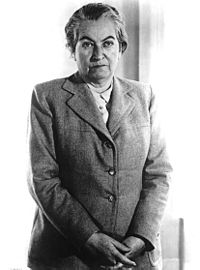Difference between revisions of "Gabriela Mistral"
From QueerBio.com
m (1 revision) |
|||
| Line 1: | Line 1: | ||
| + | [[File:mistral.jpg|200px|thumb|left|Gabriela Mistral]] | ||
| + | |||
==Country== | ==Country== | ||
| Line 17: | Line 19: | ||
==Description== | ==Description== | ||
| − | Poet and teacher, became a legend of international stature and matriarchial figure in Latin America. Feminist icon. First Latin American to win Nobel prize, 1945. | + | Poet and teacher, became a legend of international stature and matriarchial figure in Latin America. Feminist icon. First Latin American to win Nobel prize, 1945. Lived in exile for most of her life (France, United States, Brazil) due to her popularity. Some of Mistral's best known poems include Piececitos de Niño, Balada, Todas Íbamos a ser Reinas, La Oración de la Maestra, El Ángel Guardián, Decálogo del Artista and La Flor del Aire. She wrote and published some 800 essays in magazines and newspapers. |
Revision as of 13:37, 11 August 2013
Country
Chile
Birth - Death
1898 - 1957
Occupation
Writer
Notable Achievements
Nobel Prize
Description
Poet and teacher, became a legend of international stature and matriarchial figure in Latin America. Feminist icon. First Latin American to win Nobel prize, 1945. Lived in exile for most of her life (France, United States, Brazil) due to her popularity. Some of Mistral's best known poems include Piececitos de Niño, Balada, Todas Íbamos a ser Reinas, La Oración de la Maestra, El Ángel Guardián, Decálogo del Artista and La Flor del Aire. She wrote and published some 800 essays in magazines and newspapers.

